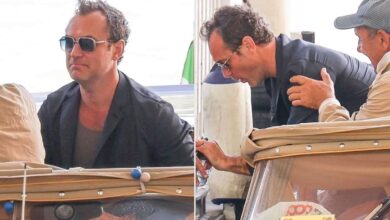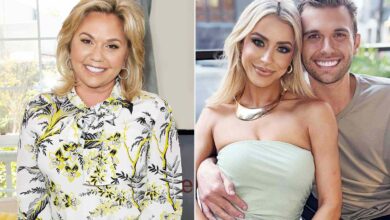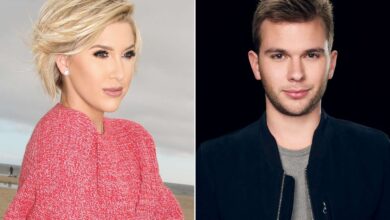Katy Rose Claims She Was Meant to Have Avril Lavigne’s Career (Exclusive)
:max_bytes(150000):strip_icc():format(jpeg)/Katy-Rose-082425-3-f7b4b48f4bc74b54ac5ee5c95daddd27.jpg)
NEED TO KNOW
- Katy Rose says she could have had Avril Lavigne’s career, but a series of hurdles got in the way
- In an exclusive interview with PEOPLE, the singer-songwriter reflects on grappling with teen fame and how placements on the Thirteen and Mean Girls soundtracks transformed her career
- “I just got famous, which is weird. It ruins your life in a lot of ways,” she says
There was a time when Katy Rose was a fixture of MTV.
The singer-songwriter could be seen waking up on the beach with a smudged smoky eye, peeling and savoring citrus fruits and enjoying a carefree bike ride. At least in her music video for her angsty debut single “Overdrive,” which, for a while, was a buzzy visual on Total Request Live‘s rotation.
Rose, with her blonde waves and dark lowlights, had a striking resemblance to Avril Lavigne, while her music was flanked by the angst and apathy of Fiona Apple and Liz Phair. And at the time, she was primed to be a star.
Courtesy of Katy Rose
“I wasn’t very into pop music ever,” Rose, now 38, tells PEOPLE, over the phone from upstate New York. “The really depressing music was the music I wanted to put out because that’s frankly how I was feeling.”
But at the time, despite it not being representative of her personality, she was pushed toward pop by her management and record label. As a “young, moody teenager,” she didn’t want to be a “pop person.”
But the release of “Overdrive” was a game-changer for her. The song, which was initially released in 2003, earned a placement on the Mean Girls soundtrack, among other teen shows like One Tree Hill and Laguna Beach.
Courtesy of Katy Rose
The success, she found, brought her more touring and exciting gigs. But it left her with trust issues. “Especially being so young, a lot of people will take advantage of you and use you for money or contacts or to get in places,” she recalls. For Rose, there was a lot of heartbreak in the experience.
“I just got famous, which is weird,” says Rose. “It ruins your life in a lot of ways.”
But for Rose, who was raised in Los Angeles by musician parents who met while playing in bands during the ’70s, pursuing music felt kismet. She found early influences in “the ’90s power, incredible songwriter, Lilith Fair women” like Alanis Morissette, Tori Amos and Apple. By the time she was 6 years old, Rose began writing poetry in her journal.
Courtesy of Katy Rose
Growing up with her dad — songwriter and producer Kim Bullard who played with Crosby, Stills, & Nash, and Simon & Garfunkel — as well as elders who were all musicians, Rose learned how to flesh out her poetry into songs. “It’s hard to not get into doing music when you’re surrounded by that kind of iconic music, incredible songs,” she says.
At 12, she had recorded her first song and even formed a female punk trio called Ruby Red Slipper, where she learned how to be a frontperson. It wasn’t long until her songs began gaining attention from record labels, which ultimately resulted in a bidding war. Two years later, she signed a seven-record contract with V2 Records, a subsidiary of Virgin, left high school and moved to L.A.
When it came to crafting her 2004 debut album Because I Can, Rose’s father co-wrote and produced the music alongside her. “It was really natural,” she says. “People always ask me [what it was like] because the lyrics are always very vulnerable. But he’s a very eccentric, cool artist, and he was never judgmental or worried.”
Before the LP was released, one of Rose’s songs — “Lemon” — even earned a prominent feature on the soundtrack for the gut-wrenching psychodrama Thirteen. “That was the first big break I had, aside from obviously signing to the label,” recalls Rose.
Rose had been friends with Nikki Reed, the co-writer and star of the film, and, as a result, had gotten to know her stepmother — and co-writer and director — Catherine Hardwicke. “She was this cool, independent filmmaker in Venice, and I used to hang out over at their house. It all happened naturally,” says Rose.
Courtesy of Katy Rose
According to Rose, Tracy, Evan Rachel Wood’s character in the film, was heavily based on her. “I wouldn’t say, all of it with 1000% certainty.” For her, the movie, which is a raw portrayal of girlhood through sex, substance abuse and rebellion at the age of 13, mirrors what she experienced during that time.
“I can’t even watch that film,” she says. “My child will never watch that film, ever.”
When Because I Can was released the following year, she earned a boost from a feature on the Mean Girls soundtrack. But Rose found herself battling a series of hurdles along the way — including health issues.
At 11, she had developed a serious eating disorder that took over her life. When she was beginning to promote Because I Can, Rose landed in the hospital due to anorexia. “Unfortunately, it took longer to put my album out because I was in the hospital, which was a real drag,” she recalls.
Rose also found herself staving off comparisons to Lavigne, with whom she even shared a manager at one point. “People tried to kind of pit us against each other,” she recalls. “And I know Avril, she’s a really sweet girl, but we’re different. I was more of a writer and she’s, I think, a much better singer.” As Rose recalls it, she even landed her record deal before the Canadian pop-punk star, but at one point recalls that her record label pulled all of her radio slots and replaced her with Lavigne, which was “heartbreaking.”
“It really screwed it for me — and that’s not Avril’s fault at all. Those brutal things will happen, and it’s hard to not feel crushed or feel like it’s your fault, because when you’re a kid, you think everything’s your fault. You think everything’s about you. But it’s not, it’s just business,” she explains.
To make matters worse, the streaming era took off, her record label collapsed in 2007 — the same year her sophomore album Candy Eyed was released — and it was absorbed by Universal Music. There was no emphasis for the top brass to work on her music, so her music was shelved. “It happens all the time,” she says. Rose was left unable to legally release music for a decade, which was “very, very hard.”
For Rose, it was a turning point, and she knew she needed to take a step back. That year, she moved back to L.A. from New York City, where she studied child development at a local community college. In 2008, she began teaching yoga and ended up owning a children’s theater, where she worked with kids to put on shows.
Because music was on the back burner, her focus on it shifted. “I performed around L.A., but I couldn’t be ‘Katy Rose’ anymore,” she recalls. As her career stalled, Rose struggled with substances, and by 2012, she decided to get sober. “I committed to doing what was best for me,” says Rose.
That year, she also sold the children’s theater and traveled the world, learning different techniques of songwriting in Nashville, Atlanta, London and Sweden. By 30, she had largely left the music business behind and spent several years living a quiet life in Paris.
Still, Rose never stopped writing her own music. “I have loads of songs that I don’t know if I’ll ever release, but I just wasn’t allowed to release under my name. So it was a whole nightmare,” she recalls.
Courtesy of Katy Rose
By 2019, enough years had passed from her record deal that she could release music again, so Rose had planned to share her next album. But amid the COVID-19 pandemic, the record, Let’s Become, was pushed to 2022.
In June, Rose released her latest album Fully Alive, which largely focused on her experience in recovery. “It still has to be just a huge part of my life, and [the album] is literally called Fully Alive because it’s about my choice to live,” she says. However, Rose believes her most recent LP will be her last solo album. “I don’t think I’m going to do it anymore,” she says. “It’s hard being a solo artist.” Instead, she’s found meaning in the music business in other ways.
Beyond her own music, Rose is in two bands — an electronic duo the dead Set and feminist punk trio The Blushes — and she is producing artists behind the scenes. “That’s much more fulfilling to me than just writing about myself at this point in my life,” she says. “I don’t want to be really like ‘singer-songwriter-y.’ I played a lot, and it wasn’t giving me the fulfillment that playing in bands and collaborating with other people, and frankly, just working more behind the scenes does.”
For Rose, it’s been particularly “really healing” to collaborate with young women in the music business to “try to be protective of them in a way that I wish more people had protected.” At some point, she aspires to collaborate with Sabrina Carpenter or Chappell Roan. But really, it’s about finding someone who is easy to work with. “I’m really done working with difficult people, and there are so many of those in the business,” she says.
Rose’s focus on more behind-the-scenes work stems from her dream of having kids with her producing partner and fiancé, Eric, in the next couple of years. “I want to build our production company that we have at our home,” she says. “I would love to really be growing and building that as we release more music and playing one-off [shows] basically, while I can be home with my kids.”
Credit to Nypost AND Peoples



